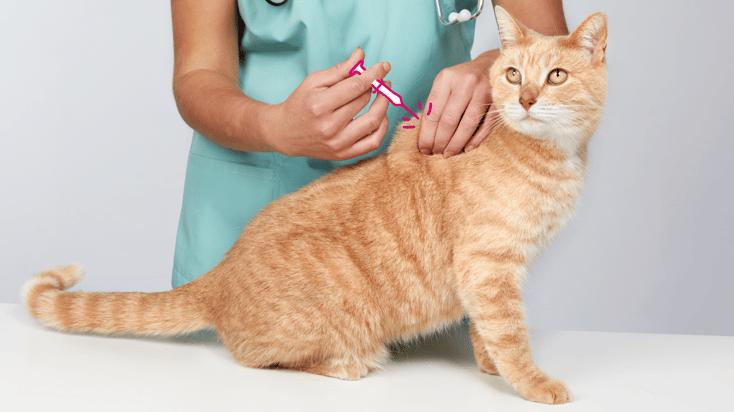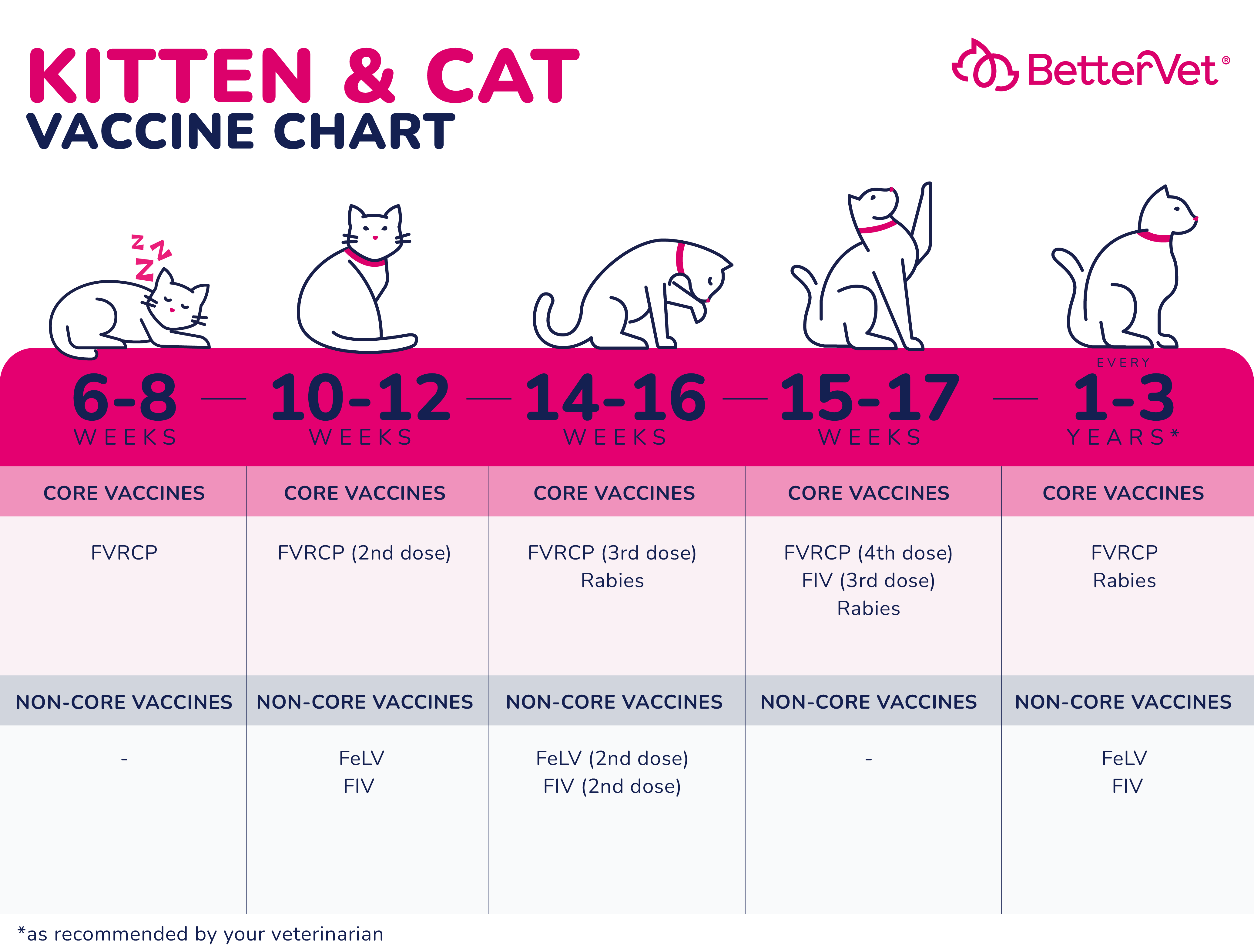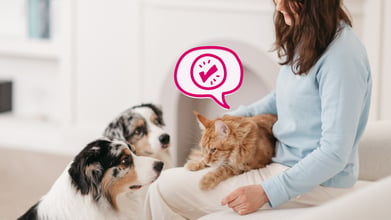Kitten and Cat Vaccinations: Schedule, Types, and Side Effects

Table of Contents
As a veterinarian with BetterVet, I often emphasize the importance of vaccines for growing kittens and adult cats.
Vaccines help to protect them from serious infectious diseases and are one of the most important things pet parents can do to keep their furry friends healthy and happy.
Why Vaccinate Your Cat?
Both kittens and adult cats need vaccines to maintain healthy immunity and stay protected from common illnesses and diseases. Kittens are most vulnerable to diseases when they are under six months old.
While kittens receive immunity from their mother through milk, this natural immunity declines over time, so they need vaccinations. Adult cats need vaccine boosters and non-core vaccinations, dependent on location and lifestyle.
Common Cat Vaccinations
Feline vaccinations fall into two categories: core and non-core vaccines. Each of which are important for keeping your cat healthy and disease-free.
Core Vaccines for Cats
Core vaccines are strongly recommended for all kittens and cats, regardless of the region they live in or their lifestyle.
The list of core vaccinations for cats include:
Rabies Vaccine
Rabies is one of the deadly viral diseases in cats and is commonly spread through bite wounds. Symptoms of the disease are aggression, drooling, nervousness, and dilated pupils.
Typically, the rabies vaccine is administered between 12 and 16 weeks.
FVRCP Vaccine
This combination vaccine protects against feline panleukopenia, rhinotracheitis, and calicivirus in a single shot.
It is generally started at 6-8 weeks of age and then repeated every 3-4 weeks until at or after 16 weeks and includes:
-
Feline Panleukopenia (FPV): Feline panleukopenia virus, also known as feline distemper, affects cats' immune, nervous, and gastrointestinal systems.
-
Feline Viral Rhinotracheitis (FVR): Also known as feline herpesvirus type 1, FVR causes the majority of upper respiratory infections.
-
Feline Calicivirus (FCV): Feline calicivirus spreads through direct contact with the saliva, nasal mucus and eye discharge of infected cats and through aerosol droplets.
Non-Core Cat Vaccines
Non-core vaccines (or lifestyle vaccines) refer to immunizations that are not necessary for all kittens and cats. Your veterinarian will recommend specific ones depending on your location and your cat's lifestyle.
Non-core vaccines for cats include:
Feline Leukemia Virus (FeLV) Vaccine
Feline leukemia virus is spread through feces, nasal discharge, and saliva. Symptoms include anemia, immune suppression, and lymphoma. This vaccine is highly recommended for all kittens.
Feline Immunodeficiency Virus (FIV) Vaccine
Feline immunodeficiency virus destroys a cat's immune system and leads to chronic or recurrent infections of the skin and eyes as well as the urinary and respiratory tracts.
The administration of the FIV vaccine should be restricted to cats at high risk of infection, such as outdoor fighting cats and FIV-uninfected cats living with FIV-infected cats.
Chlamydophila Felis Vaccine
Chlamydophila Felis is a bacteria that causes conjunctivitis (eye inflammation) and respiratory problems in infected cats. It's an intranasal vaccine and is only recommended in high risk multi-cat environments.
Bordetella Vaccine
Bordetella is a bacterial infection that can cause your cat to develop an upper respiratory infection. This vaccine, administered intranasally, is recommended for high risk households or shelters with multiple cats.
Feline Leukemia Virus Vaccine (FeLV)
While not considered essential, it is one of the annual cat vaccines commonly administered to any adult cat that spends time outdoors.
Feline Infectious Peritonitis Vaccine (FIP)
The FIP vaccine is not recommended by the AAFP, but may be appropriate for your cat under certain conditions. If so, your veterinarian will suggest adding it to your cat’s vaccination schedule.
Kitten and Cat Vaccination Schedules
Our licensed veterinary team has compiled a useful chart for both kitten and cat vaccination schedules. This will give pet parents a clearer understanding of when to book a vaccination appointment according to their feline's age.

Kitten Vaccination Timeline
To safeguard kittens, their vaccinations are given every two to four weeks starting at 6-8 weeks old, to build their immunity as maternal antibodies decrease.
Keep reading: What Happens During a Kitten's First Vet Visit?
For kittens in areas with a higher risk of diseases, extending the vaccination period to 20 weeks can provide additional protection. This vaccination schedule is crucial for their early protection against diseases and lays the groundwork for a healthy life.
|
Age |
Core Vaccines |
Noncore Vaccines |
|
6 to 8 Weeks |
FVRCP |
|
|
10 to 12 Weeks |
FVRCP (2nd Dose) |
|
|
14 to 16 Weeks |
FVRCP (3rd Dose) |
|
|
15 to 17 Weeks |
|
Adult Cat Vaccination Timeline
For adult cats, booster shots for core vaccines are administered every one to three years, depending on the specific vaccine, the cat's overall health, and regional guidelines. These boosters are essential for sustaining immunity against crucial diseases throughout their lives. Boosters for non-core vaccines are provided based on the cat's lifestyle, geographical area, and potential exposure to certain diseases, ensuring they receive protection tailored to their specific needs and risks.
|
Frequency |
Core Vaccines |
Noncore Vaccines |
|
Every 1 to 3 Years |
|
|
Side Effects of Feline Vaccinations
While vaccinations should be quick and relatively painless, some mild side effects should be expected. Rarely, a more serious reaction can occur, so it’s important to know what to watch for.
Mild Cat Vaccination Side Effects
-
Pain or swelling at the injection site
-
Mild fever
-
Decreased appetite
More Serious Cat Vaccine Reactions
Serious reactions are rare, but the symptoms can be part of an anaphylactic reaction, which is potentially life-threatening.
-
Vomiting or diarrhea
-
Facial swelling
-
Hives
-
Collapse
-
Severe lethargy
-
Lumps at the injection site
If you notice your cat displaying the symptoms above, please contact a veterinarian immediately.
Should My Pet Be Seen by a Veterinarian?
1. Have you noticed changes in your pet’s appetite?
2. Does your pet have diarrhea or loose stools?
3. Have you noticed changes in your pet’s thirst/water consumption?
4. Is your pet having accidents in the house?
5. Is your pet pacing and unable to settle?
6. Is your pet panting more than usual?
7. Is your pet whining or vocalizing more than usual?
8. Is your pet shaking more than usual?
9. Is your pet hiding or avoiding physical contact more than usual?
10. Is your pet more lethargic and sleeping more than usual?
11. Are you concerned about changes in your pet’s behavior?
12. Is your pet scratching their ears?
13. Is your pet licking their paws more than usual?
14. Does your pet have a rash?
15. Is your pet moving more slowly than usual or having a harder time getting up or down?
View Results
Should My Pet Be Seen by a Veterinarian?
1. Have you noticed changes in your pet’s appetite?
2. Does your pet have diarrhea or loose stools?
3. Have you noticed changes in your pet’s thirst/water consumption?
4. Is your pet having accidents in the house?
5. Is your pet pacing and unable to settle?
6. Is your pet panting more than usual?
7. Is your pet whining or vocalizing more than usual?
8. Is your pet shaking more than usual?
9. Is your pet hiding or avoiding physical contact more than usual?
10. Is your pet more lethargic and sleeping more than usual?
11. Are you concerned about changes in your pet’s behavior?
12. Is your pet scratching their ears?
13. Is your pet licking their paws more than usual?
14. Does your pet have a rash?
15. Is your pet moving more slowly than usual or having a harder time getting up or down?
Share Quiz
Conclusion
Prioritizing your cat's health is paramount, and vaccinations play a pivotal role. We are pleased to offer mobile pet vaccinations along with comprehensive wellness exams to ensure your cat receives top-notch care during their whole lifetime.
Your BetterVet veterinarian will create a kitten and cat vaccination program tailored to your pet’s needs. Ask about our Pet Wellness plans to manage the cost of your cat’s vaccines with one affordable monthly payment!
Stress-Free Vaccinations for Your Furry Friend
Get your pet vaccinated in their favorite spot - at home. No need to hassle with carriers or car rides.
Frequently Asked Questions
How often do adult cats need boosters after their kitten shots?
Adult cats should be re-vaccinated one year following the completion of the kitten vaccine series, and then every 1 to 3 years thereafter depending on the type of booster administered.
Can I give my kitten shots at home, or is a vet needed?
Your veterinarian is the most qualified person to give vaccines and some can only be legally administered by a veterinarian. BetterVet veterinarians can administer your cat’s vaccinations at home, where they are most relaxed.
How do vaccine schedules differ for indoor and outdoor kittens?
Generally, all kittens receive the same vaccines on the same timeline. However, adult booster vaccines can differ as a result of lifestyle differences. For example, all kittens should be vaccinated for the leukemia virus; however, this vaccine is typically only continued annually for cats allowed outdoors.
Can vaccinations interfere with other kitten treatments?
It is important to let your veterinarian know if your kitten is receiving other treatments. They may recommend adjusting the timing of the treatments or the kitten's vaccines.
Do indoor cats need vaccines?
Yes, your indoor cat needs vaccination, as diseases don't always require direct contact to be transmitted.
What happens if I don't vaccinate my indoor cat?
An unvaccinated indoor cat is at risk of contracting feline distemper, viral rhinotracheitis, calicivirus, and any other infectious disease.
How much do kitten and cat vaccines cost?
The typical range to vaccinate your kitten or cat is between $60 and $100 per immunization. The exact vaccine prices will vary depending on location, vaccine duration, and specific health needs. To help manage vaccination costs, you can discuss pet wellness plans with your veterinarian.
How are cat vaccines administered?
Vaccines are administered to kittens and cats either as injections or nasal drops. The sites for injectable vaccines in cats are below the elbow of the front right leg or below the knee joint of the right or left leg. The tail is also a possible injection site.




